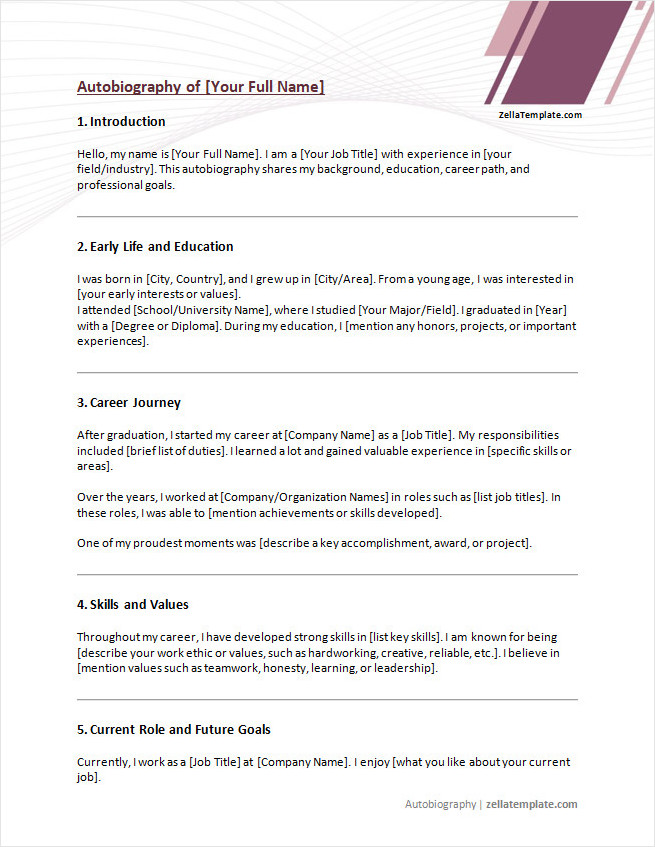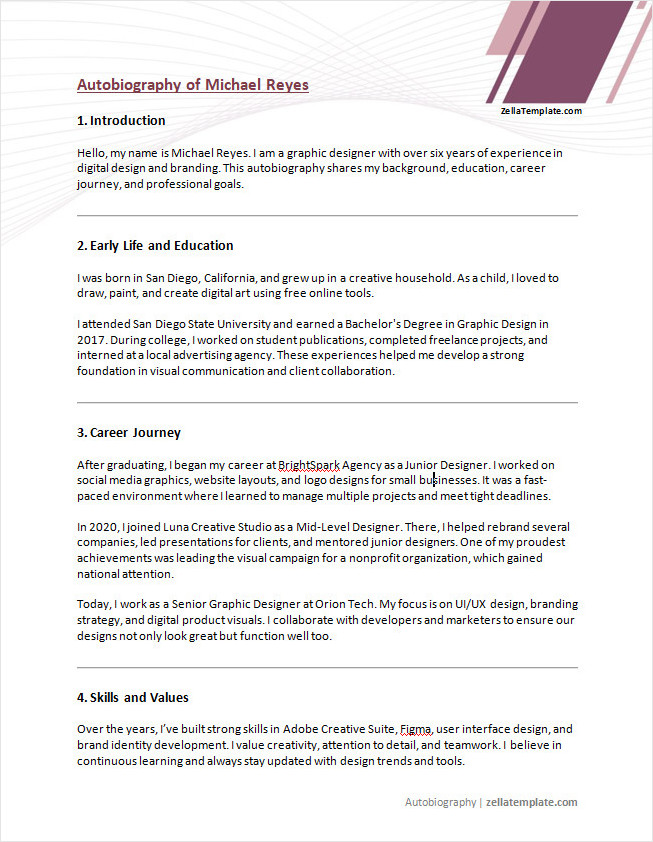
Table of Contents
Autobiographies are powerful tools that allow individuals to share their life stories in their own words. From childhood memories to career milestones, an autobiography provides a first-person account of the author’s experiences, reflections, and perspectives. It offers readers a unique insight into the author’s journey, showcasing their upbringing, education, challenges, achievements, and personal growth.
Writing an autobiography can be a form of self-reflection, helping the author explore their identity and connect with others on a deeper level.
What Is an Autobiography?
An autobiography is a literary genre where the author narrates their own life story. Unlike a biography, which is written by someone else about another person, an autobiography is a first-person account of the author’s experiences.
It allows the author to reflect on their life journey, share personal insights, and connect with readers on a more intimate level.
Autobiography vs. Biography: What’s the Difference?
While both autobiographies and biographies focus on recounting someone’s life story, there are key differences between the two genres. Autobiographies are written by the person, providing a firsthand perspective on their experiences.
On the other hand, biographies are written by someone other than the subject, often based on research and interviews conducted with them. Autobiographies tend to be more personal and introspective, while biographies offer a more objective view of a person’s life.
1. Personal Perspective in Autobiographies
One of the primary distinctions between autobiographies and biographies is the personal perspective they offer. Authors of autobiographies have the freedom to share their innermost thoughts, feelings, and reflections, giving readers a deeper insight into their motivations and experiences.
2. Objective Approach in Biographies
In contrast, biographies take a more objective approach to storytelling, presenting the subject’s life story through the lens of an external observer. Biographers rely on research, interviews, and historical records to construct a comprehensive narrative of the subject’s life, focusing on facts and events rather than personal reflections.
3. Authenticity in Autobiographies
Autobiographies are valued for their authenticity and honesty, as authors have the freedom to share their truth without the filter of a third-party perspective. Readers often gravitate towards autobiographies for the raw and unfiltered glimpse into the author’s life, emotions, and experiences.
4. Historical Accuracy in Biographies
Biographies, on the other hand, prioritize historical accuracy and factual information to present a well-rounded portrait of the subject. Biographers strive to provide a comprehensive and balanced account of the subject’s life, drawing on multiple sources to corroborate details and events.
5. Connection with Readers in Autobiographies
Autobiographies create a personal connection between the author and the reader, eliciting empathy, understanding, and shared experiences. Readers often resonate with the author’s struggles, triumphs, and growth, finding inspiration and solace in the shared human experience.
6. Historical Perspective in Biographies
Biographies offer a historical perspective on the subject’s life, placing their achievements, contributions, and impact within a broader context. Biographers contextualize the subject’s life story within the social, political, and cultural milieu of their time, providing readers with a deeper understanding of their significance.
Why You Should Write an Autobiography?
There are several reasons why writing an autobiography can be a meaningful and rewarding experience. Here are some benefits of sharing your life story through an autobiography:
1. Self-Reflection Through Writing
Writing an autobiography provides an opportunity for self-reflection and introspection, allowing you to explore your life journey, values, and beliefs. By reflecting on your experiences and choices, you can gain insight into your identity and personal growth.
2. Preserving Personal Memories
An autobiography serves as a personal archive of memories, capturing significant moments, relationships, and milestones in your life. By documenting your story, you can preserve your legacy for future generations and ensure that your experiences are remembered and cherished.
3. Inspiring Others Through Your Story
Sharing your life story in an autobiography can inspire others facing similar challenges, setbacks, or aspirations. By recounting your struggles, triumphs, and lessons learned, you can offer hope, motivation, and guidance to readers seeking inspiration and encouragement.
4. Connecting with Readers on a Deeper Level
Writing an autobiography allows you to connect with readers on a more intimate and personal level, fostering empathy, understanding, and shared experiences. By sharing your vulnerabilities, strengths, and insights, you can create a bond with readers who resonate with your story.
5. Reflecting on Personal Growth and Development
An autobiography enables you to trace your personal growth, development, and transformation over time, highlighting milestones, challenges, and moments of self-discovery. By examining your journey through writing, you can appreciate how far you have come and envision your future path.
6. Leaving a Lasting Legacy
Writing an autobiography leaves a lasting legacy for your loved ones, friends, and community, preserving your voice, values, and life story for future generations. Your autobiography becomes a testament to your experiences, beliefs, and contributions, ensuring that your legacy endures beyond your lifetime.
7. Empowering Yourself Through Storytelling
Storytelling in an autobiography empowers you to reclaim your narrative, share your truth, and celebrate your unique journey. By owning your story and embracing your experiences, you can find healing, strength, and empowerment in the act of self-expression.
How to Write an Autobiography?
When embarking on the journey of writing your autobiography, there are several key steps to keep in mind. Here are some tips to help you craft a compelling and authentic account of your life:
1. Start with an Outline
Begin by outlining the key events, memories, themes, and milestones you want to include in your autobiography. Organize your thoughts chronologically or thematically to create a structured framework for your narrative.
2. Capture Your Voice and Tone
Find your authentic voice and tone as you write your autobiography, reflecting your personality, emotions, and perspective. Whether you choose a formal, conversational, or reflective style, let your unique voice shine through in your writing.
3. Weave in Personal Anecdotes
Enhance your autobiography with personal anecdotes, stories, and reflections that bring your experiences to life. Share memorable moments, interactions, and insights that showcase your personality and journey.
4. Reflect on Key Moments and Lessons
Take time to reflect on the key moments, challenges, achievements, and setbacks in your life, exploring the lessons learned, growth experienced, and transformations undergone. Share your insights and reflections on how these events shaped your identity.
5. Celebrate Your Strengths and Resilience
Acknowledge and celebrate your strengths, resilience, and perseverance in the face of adversity or obstacles. Highlight moments of courage, determination, and growth that showcase your inner strength and character.
6. Include Dialogue and Descriptive Details
Bring your autobiography to life by including dialogue, descriptive details, and sensory imagery that engage the reader’s senses and emotions. Use vivid language to paint a vivid picture of your experiences, surroundings, and interactions.
7. Embrace Vulnerability and Authenticity
Embrace vulnerability and authenticity in your writing, sharing honest and raw emotions, thoughts, and vulnerabilities. Allow yourself to be open and transparent in discussing your fears, struggles, and insecurities.
8. Show Your Growth and Transformation
Showcase your personal growth and transformation throughout your autobiography, demonstrating how you have evolved, learned, and changed over time. Illustrate moments of self-discovery, enlightenment, and personal development.
9. Edit and Revise Your Narrative
After completing your first draft, take the time to edit, revise, and refine your narrative to ensure clarity, coherence, and impact. Review your autobiography for grammar, punctuation, spelling errors, and consistency in tone and style.
10. Seek Feedback and Input
Share your autobiography with trusted friends, family members, or writing peers to receive feedback and constructive input on your narrative. Consider their perspectives, suggestions, and critiques to improve the overall quality of your autobiography.
11. Stay True to Your Authentic Voice
While incorporating feedback and edits, remember to stay true to your authentic voice, story, and perspective. Honor your experiences, emotions, and beliefs by preserving the integrity and honesty of your narrative.
12. Celebrate Your Unique Story
Celebrate your unique story, voice, and journey as you complete your autobiography. Embrace your individuality, experiences, and growth, recognizing the value and significance of your life story as a testament to your resilience and spirit.
13. Share Your Autobiography with Others
Once you have finalized your autobiography, consider sharing it with a wider audience through publication, readings, or online platforms. Allow your story to inspire, educate, and empower others who may find solace, inspiration, or connection in your narrative.
14. Continue Your Writing Journey
Writing an autobiography is just one chapter in your ongoing writing journey. Consider exploring other genres, styles, and themes in your future writing projects, continuing to share your voice, experiences, and insights with the world.
15. Embrace the Power of Storytelling
Storytelling is a powerful tool for connection, understanding, and self-expression. Embrace the art of storytelling in your autobiography and future writing endeavors, recognizing the transformative impact of sharing your narrative with others.
Autobiography Example

Autobiography Template – Word